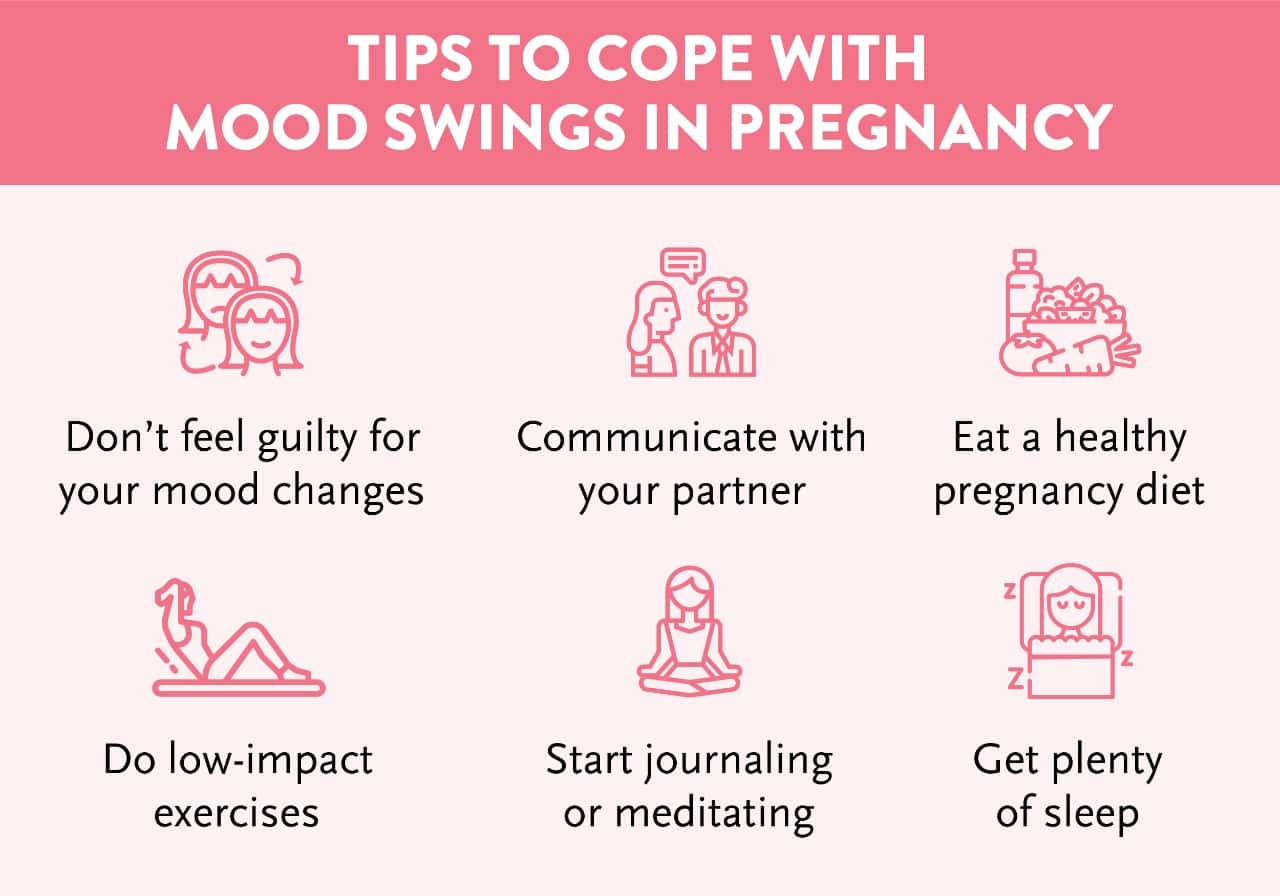What leads to mood swings during pregnancy?
Your body starts to prepare for the course of pregnancy as soon as conception happens. The tremendous changes you go through during gestation are necessary to host the growth of your baby.
It is only natural to experience a shift in how you feel. Various factors attribute to the emotional ups and downs of pregnancy.
- Hormonal changes – Pregnancy hormones are the primary reason for emotional changes in a woman. During the first 12 weeks, there is a sudden surge in estrogen and progesterone. While these hormones are vital for placental growth, they also take a toll on the mother’s emotional health. Estrogen is associated with mood imbalances leading to easy irritability and anxiety. On the other hand, progesterone helps the muscles to relax and avoid early contractions. The increasing levels of both these hormones make it difficult for the expecting mother to adjust her emotions.
- Fatigue and disturbed sleep pattern – Pregnancy-associated fatigue is often underestimated. The rising hormonal levels alter the physical outlook of the expectant mother’s body. The internal organs in a woman work exhaustingly to accommodate healthy fetal development. These changes tend to affect a woman’s sleep patterns and build up fatigue. It is normal to have mood changes affected by deprivation of sleep.
- Anxiety and stress of changing dynamics – Pregnancy is a major milestone for most couples. It is a life-changing event that impacts the prospects of their plans, career goals, family settings and more. During pregnancy, it is reasonable to think through these aspects. Most women experience a sense of anxiety and fear of how events will unfold after they have a baby. There are financial issues to manage along with the change of the household environment. Mood swings during pregnancy are affected by these issues.
How to deal with the different mood changes in pregnancy?
No two pregnancies are alike. Every preg必利勁
nant woman experiences a different set of mood swings at a unique intensity. Here are some common mood swings during pregnancy and strategies to help you deal with them.
Happiness
The thought of starting or expanding your family with the arrival of a baby is the most joyous feeling for most women. Chemically, the good emotions that you feel during pregnancy are linked with the rise in estrogen hormones. Estrogen is responsible for regulating your mood and is associated with serotonin (the happy hormone). In the early stages, you are likely to feel very enthusiastic and excited about this journey.
The easiest way to cope with happiness is to spread it. These hormones can help you bond with your partner in an extraordinary manner.
Irritation
Along with estrogen, your body will also undergo an increase in the levels of progesterone. This hormone keeps the muscles from contracting and thus, may cause weariness and fatigue. The constant shift between estrogen and progesterone can make you irritable towards small inconveniences.
You should seek your partner’s support to cope with irritation and fatigue. It is always better to inform others about your heavy feelings. You can make a list of activities or conversations that particularly irk you and avoid them on bad days.
Sexual drive
Most women experience an elevated sex drive, especially in the second trimester. While for some, the idea of having sexual intercourse during pregnancy is strange, others tend to enjoy it. The increased libido is a result of increased blood flow in your body.
Sexual intercourse during pregnancy is mostly safe. You should, however, consult your OB-GYN and discuss if it is safe for you to have sexual activi犀利士
ty. You should also consider your partner’s comfort and have an at-length discussion.
Tiredness
Pregnancy can make you feel distinctly tired. Your body will be making overwhelming adjustments to support the growth of your baby. Besides the hormonal imbalances, the side-effects of pregnancy such as morning sickness can add to your sense of fatigue. In addition to caring for your health, you have to continue working on your routine tasks or manage your job. All of these factors contribute to a feeling of exhaustion.
The best solution to overcoming fatigue is rest. You should focus on prioritising your tasks and making time for sleep. You can try to adopt a new self-care routine to help you relax and prepare for the next day.
Anxiety
If you feel uncontrollably anxious during pregnancy, you are not alone. Anxiety is a very common emotion felt by expecting mothers. While you would be busy adapting the consistent changes, you may feel fearful of what is to come. A wide spectrum of aspects need attention during this sensitive time – your health, child’s health, career, family, monetary issues, goals and whatnot.
Anxiety can be overwhelming to cope with. The ideal strategy for pregnant women is to take one day at a time. While you should have a plan for the future, try not to think too much about the several ‘what ifs’. You can start journaling your thoughts to help alleviate anxiety.
Fear
Fear and anxiety are correlated. The intense sense of fear is mostly associated with the outcomes of pregnancy. As a woman progresses in her pregnancy, her sense of fear also changes. During the first trimester, most women fear having a loss of pregnancy. While in the second trimester, they are worried about their capacity for motherhood. By the third trimester, most women fear the complications of childbirth and labour.
It is okay to be fearful for the health of yourself and your baby. You can, however, eliminate most fears by rational thinking. You should frequently discuss your concerns with your OB-GYN. You should aim to practice all the clinical guidelines to have a healthy and safe pregnancy.
Forgetfulness
Pregnancy can make you more forgetful and disoriented. The mood swings during pregnancy-related to lack of concentration and memory issues are known as ‘baby bra樂威壯
in’. The cognitive thinking and犀利士
ability to remember becomes weak in expectant mothers. The higher levels of progesterone are accountable for this situation.
You can easily deal with the occasional forgetfulness by maintaining a small diary. If you feel you miss out on something important, just note it down for the future. You should seek your partner’s support through these memory lapses.
Weepiness
You may find yourself wanting to cry at minor difficulties during pregnancy. The fluctuation of pregnancy hormones impacts your emotional capacity. Sometimes, a joyful occasion can also make you tearful. Most expecting women tend to cry when they are unable to manage the internal mixup of hormonal and chemical imbalances.
You should remember that crying is not a sign of weakness. You should discuss your feelings with your partner. If your emotions well-up, you should consider talking to a counsellor.
Body image issues
We seldom see women in plus sizes or imperfections on television or even social media. This representation is also applicable for pregnant women. However, pregnancy can have more clear 樂威壯
effects on your face, skin and size. Some expecting mothers start to have body image issues during the second and third trimester of pregnancy when the bump is more pronounced.
You should remember that the gained body weight is only temporary. Instead of hampering self-esteem, you should delight in the pregnancy glow. You can also go to a salon and get a new skincare routine to pamper yourself.
Mixed emotions
The mood changes in pregnancy are sometimes very random. The interplay of mood swings can leave you confused, angry, frustrated, irritated and more all at once. It is a very commonplace situation for pregnant women.
The best coping strategy to deal with mixed emotions is to identify the exact mood and the reason behind it. Narrowing down your mixed moods to one or two feelings can give you more clarity on how to address them. You can talk to your OB-GYN or counsellor about this.
Tips to manage mood swings during pregnancy
Here are some expert-approved tips to help you deal with the mood swings:
- Do not feel guilty for your mood swings.
- Discuss your emotions with your partner and set healthy boundaries.
- Eat a healthy diet so that your body does not run out of nutrients.
- Do lightweight exercises to boost your mood.
- Start journaling or meditation to cope with mixed feelings.
- Make sure to get enough rest and do not overburden yourself with tasks.

Mood swings during pregnancy is a routine phenomenon. You should let all your emotions come and go at their own pace.
If your negative emotions do not subside by practising these techniques for up to 2 weeks, consult your doctor.











